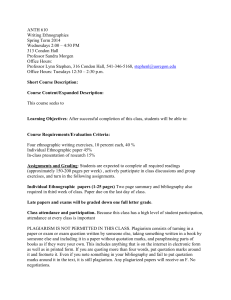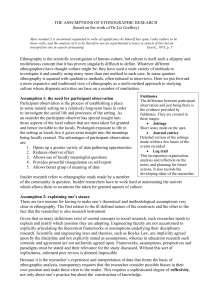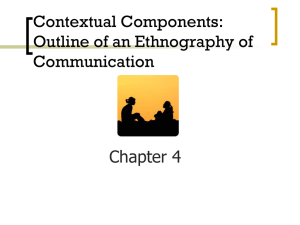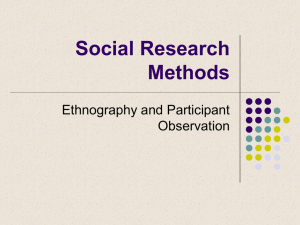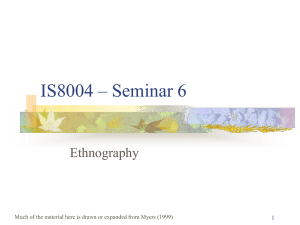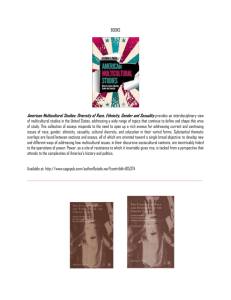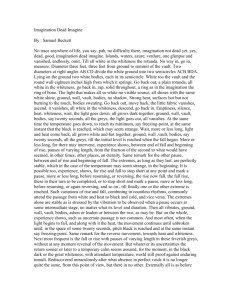Appendix D
advertisement
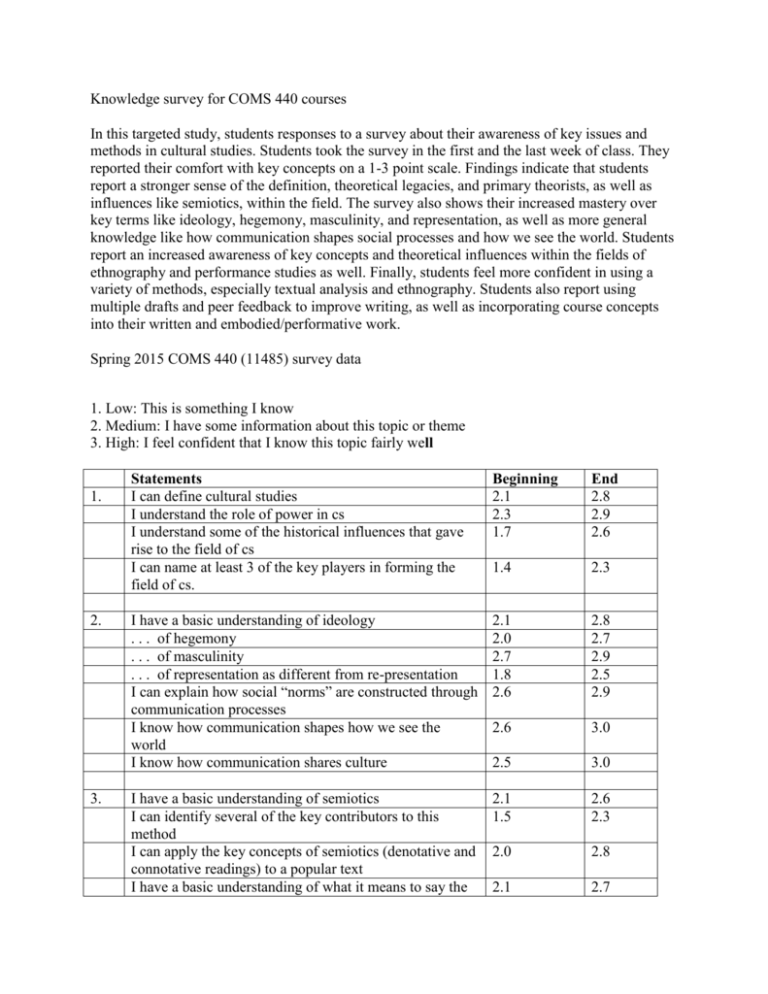
Knowledge survey for COMS 440 courses In this targeted study, students responses to a survey about their awareness of key issues and methods in cultural studies. Students took the survey in the first and the last week of class. They reported their comfort with key concepts on a 1-3 point scale. Findings indicate that students report a stronger sense of the definition, theoretical legacies, and primary theorists, as well as influences like semiotics, within the field. The survey also shows their increased mastery over key terms like ideology, hegemony, masculinity, and representation, as well as more general knowledge like how communication shapes social processes and how we see the world. Students report an increased awareness of key concepts and theoretical influences within the fields of ethnography and performance studies as well. Finally, students feel more confident in using a variety of methods, especially textual analysis and ethnography. Students also report using multiple drafts and peer feedback to improve writing, as well as incorporating course concepts into their written and embodied/performative work. Spring 2015 COMS 440 (11485) survey data 1. Low: This is something I know 2. Medium: I have some information about this topic or theme 3. High: I feel confident that I know this topic fairly well 1. 2. 3. Statements I can define cultural studies I understand the role of power in cs I understand some of the historical influences that gave rise to the field of cs I can name at least 3 of the key players in forming the field of cs. Beginning 2.1 2.3 1.7 End 2.8 2.9 2.6 1.4 2.3 I have a basic understanding of ideology . . . of hegemony . . . of masculinity . . . of representation as different from re-presentation I can explain how social “norms” are constructed through communication processes I know how communication shapes how we see the world I know how communication shares culture 2.1 2.0 2.7 1.8 2.6 2.8 2.7 2.9 2.5 2.9 2.6 3.0 2.5 3.0 I have a basic understanding of semiotics I can identify several of the key contributors to this method I can apply the key concepts of semiotics (denotative and connotative readings) to a popular text I have a basic understanding of what it means to say the 2.1 1.5 2.6 2.3 2.0 2.8 2.1 2.7 relationship between the signifier and signified is arbitrary 4. 5. 6. 7. 8. I can define ethnography I can define culture I feel fairly comfortable using ethnography as a tool to analyze a culture of which I am a part or which I’ve observed I know what fieldnotes are I can observe a culture and generate fieldnotes I feel fairly confident that I could conduct and analyze an interview to create ethnographic data 1.9 2.6 1.8 2.9 3.0 2.6 1.7 1.8 1.7 2.7 2.7 2.7 I can define performance studies I can define performativity I can explain how gender is a performance I understand that gender is stabilized through the repetition of performative acts I understand how the performance of gender naturalizes certain norms I understand some of the historical influences that gave rise to the field of performance studies I can name at least three of the key players in forming the field of performance studies 2.1 1.9 2.3 2.0 2.8 2.7 2.9 2.7 2.3 2.8 1.7 2.6 1.4 2.4 I have a basic understanding of whiteness I understand how whiteness is framed in popular culture I have a basic understanding of how racism and sexism are perpetuated in popular culture I have a basic understanding of how whiteness is privileged within popular culture 2.4 2.4 2.6 2.9 2.9 2.9 2.6 2.9 I can apply theoretical concepts to a popular culture text. I can identify the dominant themes in a pop culture text through which identity and power are negotiated I can build a creative representation of ethnographic fieldwork I can use theoretical concepts to analyze a culture of which I am a part of which I’ve observed I can write multiple drafts of a paper and use feedback to improve on previous drafts I can provide useful feedback on my peers’ writing 2.0 2.2 2.6 2.7 1.7 2.7 2.1 2.7 2.4 2.8 2.5 2.8 I can apply key concepts from class readings to embodied action through performance 2.3 2.7 I feel fairly comfortable drawing on my own life experience to create performance I can work with others to create a meaningful narrative through performance I can use props to create and arrange space 2.5 2.8 2.5 2.8 2.5 2.9 Fall 2014 COMS 440 (11485) survey data 1. Low: This is something I know 2. Medium: I have some information about this topic or theme 3. High: I feel confident that I know this topic fairly well 1. 2. 3. 4. 5. Statements I can define cultural studies I understand the role of power in cs I understand some of the historical influences that gave rise to the field of cs I can name at least 3 of the key players in forming the field of cs. Beginning 2.2 2.3 2.0 End 2.9 2.9 2.7 1.2 2.6 I have a basic understanding of ideology . . . of hegemony . . . of masculinity . . . of representation as different from re-presentation I can explain how social “norms” are constructed through communication processes I know how communication shapes how we see the world I know how communication shares culture 2.1 2.0 2.6 1.8 2.5 2.8 2.8 2.9 2.7 2.9 2.7 2.9 2.7 3.0 I have a basic understanding of semiotics I can identify several of the key contributors to this method I can apply the key concepts of semiotics (denotative and connotative readings) to a popular text I have a basic understanding of what it means to say the relationship between the signifier and signified is arbitrary 1.9 1.5 2.6 2.3 1.8 2.7 1.8 2.7 I can define ethnography I can define culture I feel fairly comfortable using ethnography as a tool to analyze a culture of which I am a part or which I’ve observed I know what fieldnotes are I can observe a culture and generate fieldnotes I feel fairly confident that I could conduct and analyze an interview to create ethnographic data 2.1 2.5 2.0 2.8 2.9 2.7 1.9 1.9 1.8 2.8 2.9 2.8 I can define performance studies I can define performativity 2.0 1.8 2.9 2.8 6. 7. 8. I can explain how gender is a performance I understand that gender is stabilized through the repetition of performative acts I understand how the performance of gender naturalizes certain norms I understand some of the historical influences that gave rise to the field of performance studies I can name at least three of the key players in forming the field of performance studies 2.2 2.1 2.9 2.8 2.1 2.8 1.9 2.6 1.9 2.6 I have a basic understanding of whiteness I understand how whiteness is framed in popular culture I have a basic understanding of how racism and sexism are perpetuated in popular culture I have a basic understanding of how whiteness is privileged within popular culture 2.3 2.3 2.5 2.9 2.9 2.9 2.5 2.9 I can apply theoretical concepts to a popular culture text. I can identify the dominant themes in a pop culture text through which identity and power are negotiated I can build a creative representation of ethnographic fieldwork I can use theoretical concepts to analyze a culture of which I am a part of which I’ve observed I can write multiple drafts of a paper and use feedback to improve on previous drafts I can provide useful feedback on my peers’ writing 2.0 2.2 2.8 2.8 1.8 2.7 2.3 2.8 2.5 2.8 2.6 2.8 I can apply key concepts from class readings to embodied action through performance I feel fairly comfortable drawing on my own life experience to create performance I can work with others to create a meaningful narrative through performance I can use props to create and arrange space 2.4 2.8 2.3 3.0 2.5 2.8 2.4 2.9


